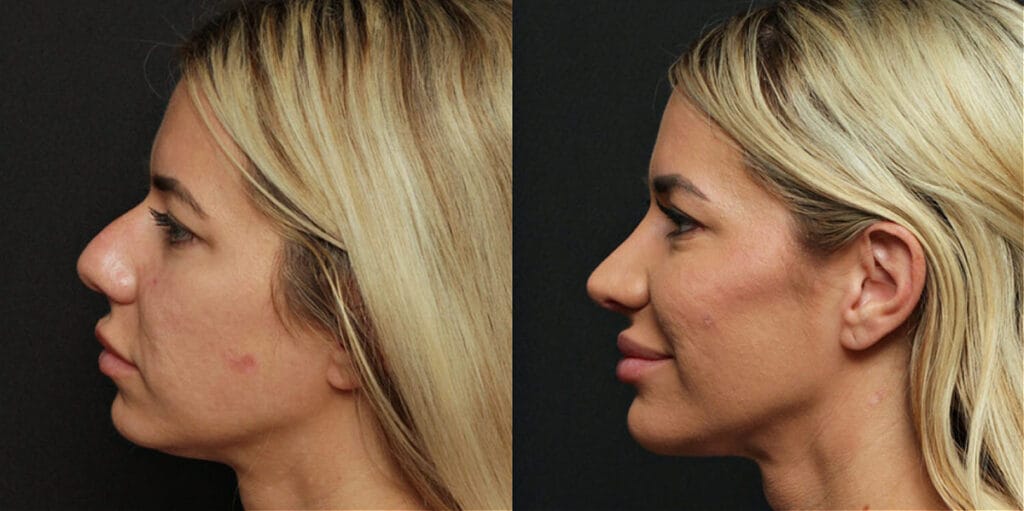Rhinoplasty is considered to be a very safe procedure when performed by an experienced cosmetic surgeon like Dr. Kevin Duplechain, but like all cosmetic surgeries, the “nose job” comes with potential risks and complications. While your choice of surgeon will help you to have a safe surgery, you can also mitigate these risks by preparing for recovery. This way, you’ll be well-prepared to follow Dr. Duplechain’s aftercare instructions.
Below, we outline the basic rhinoplasty recovery supplies, plus some arrangements to make ahead of time and other tips for recovering with comfort and ease.
Stop smoking & avoid blood thinners
First and foremost, you’ll need to take some steps to prepare your body before your surgery. It is imperative that you stop smoking or vaping ahead of surgery, as nicotine impairs your body’s ability to heal and can lead to negative cosmetic surgery results. You will also need to stop drinking and taking blood thinners, such as aspirin or ibuprofen (Advil), at least a week in advance in order to reduce your post-surgery swelling, bruising, and healing time.
Gather recovery supplies
The following items can help make your rhinoplasty recovery go smoothly:
- Nasal spray to help keep the nasal passages moist and minimize discomfort
- Cotton swabs to gently clean and apply ointments to your incisions
- Lightweight ice packs for managing post-operative swelling and bruising
- Baby wipes to gently clean the face without putting pressure on the nose
- A comfortable neck pillow and/or wedge pillow to help you sleep upright
- Cough drops to help soothe the throat and minimize the risk of postoperative coughing
- Biotene mouth spray to alleviate dry mouth and maintain oral hygiene
- Over-the-counter pain medication (extra-strength Tylenol or acetaminophen) to help manage post-operative discomfort
- Antibiotic ointment for your incisions

Based on the details of your surgical plan, Dr. Duplechain and your care team will talk with you about specific instructions for wound care and pain management over the course of your recovery. You will also have regularly scheduled post-op check in appointments where we monitor your progress and adjust protocols, as needed, as you heal.
Make plans, run errands, and prepare your space
Next, ensure that you also have the following must-haves coordinated:
- Prescription pain medications should be picked up before surgery so that no errands remain on your surgery date
- Dedicated time off, away from work, travel, childcare, or other life commitments so that you can prioritize your healing, minimize complications, and achieve the best possible results
- Soft, easily digestible foods (i.e. prepared meals in the freezer) to ensure proper nutrition while minimizing your post-surgery efforts
- Loose, comfortable clothing to allow for easy dressing and undressing
- Entertainment options like books, movies, and music to help pass the time and keep your mind occupied
- A quiet and comfortable space to foster quality rest and recovery
Tend to your emotional well-being
Lastly, don’t underestimate the psychological aspects of recovery. Your emotional healing is as crucial as your physical healing. Lean on your friends and family for support, and consider other tools to support you during this transition:
- A reliable and trusted caregiver to stay with you for at least 24 hours and then to provide logistical help such as meal prep, running errands, or assisting with wound dressings, as needed
- Meditation to help alleviate anxiety and cope with the complex emotions that may accompany facial cosmetic surgery
- Talk therapy with a specialized professional or support group to help navigate changes to your body image and self esteem
What to expect after surgery: Your week-by-week rhinoplasty recovery timeline
Initial recovery period
In the days following your rhinoplasty surgery, rest is your best friend. Follow Dr. Duplechain’s care instructions for pain management, wound cleaning, and (once your incisions are closed) scar reduction. Eat a nutritious diet to give your body the fuel it needs. To reduce swelling and bruising, apply cold compresses as needed. And, finally, avoid direct sunlight, as UV exposure can darken healing incisions and scars.
1-2 weeks post-procedure
While most patients get back to work and light activities within 1-2 weeks, it can take a month or longer to resume your full activity level and exercise regimen, depending on how you are healing. Throughout this time, you’ll be attending your scheduled follow-up appointments so that Dr. Duplechain can monitor your progress, answer your questions, and give you the OK to resume your active lifestyle.
Weeks 5-8: Approaching normalcy
By 6-8 weeks post-surgery, you’ll look and feel much more like yourself. Studies show that about 50-70% of swelling has resolved by this point. Your nose is taking on a more refined shape, and most people won’t be able to tell you’ve had recent surgery. Dr. Duplechain will likely clear you to resume full exercise and most normal activities, though you should still protect your nose from any potential impact. Breathing function continues improving as all internal tissues heal.
Months 3-6: Continued refinement
During this phase, the majority of remaining swelling fades and your nose’s contours become increasingly defined. The nasal bridge and tip sharpen and refine as deeper tissues settle. Most patients see significant improvement during these months and feel thrilled with how their nose is shaping up. However, subtle changes are still occurring, particularly in the nasal tip, which takes the longest to fully refine.
Months 6-12: Final results emerge
It takes a full year for all swelling—especially the deep, subtle swelling in the nasal tip—to completely resolve. This is when your rhinoplasty reaches its final, permanent result. The tip definition becomes crisp and clear, small irregularities smooth out, and your nose settles into its long-term shape. Throughout this entire journey, Dr. Duplechain will monitor your progress at scheduled follow-up appointments, answer your questions, and ensure you’re healing beautifully.

About Lafayette cosmetic surgeon Dr. Kevin DuplechainI have recently had the rhinoplasty procedure done with Dr. Duplechain. I have nothing but GREAT things to say about this wonderful man… He knew exactly what I wanted and I am so thrilled and satisfied with the results. I can’t thank him enough and I highly recommend him!
Real patient’s 5-star Google review
For over 20 years, Dr. J. Kevin Duplechain has been providing rhinoplasty surgery for Louisiana patients, from Lafayette to Baton Rouge to Alexandria and beyond. As a board-certified facial plastic surgeon, he has extensive experience in open and closed rhinoplasty techniques to help you achieve a more attractive and balanced nose without looking altered or unnatural.
To learn more about rhinoplasty or any other facial surgical procedures we offer, request a consultation online or call our office at (337) 456-3282. We look forward to hearing from you!


Leave a Reply